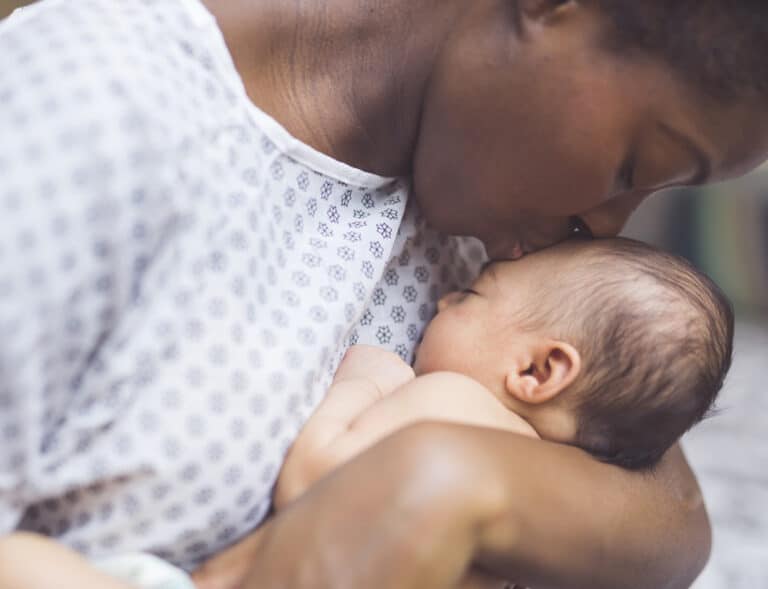Birthrights releases report of findings from year-long inquiry into racial injustice in maternity care
The safety of hundreds of women and birthing people from Black and Brown and mixed ethnicity backgrounds is being put at risk due to systemic racism within UK maternity care, a year-long inquiry by Birthrights has found.
The report, titled Systemic Racism, Not Broken Bodies, reveals the devastating impact systemic racism within maternity care is having on Black, Brown, and mixed ethnicity women and birthing people’s safety, dignity, choice, autonomy, and equality – from individual interactions and workforce culture through to curriculums and policies.
In evidence given to the inquiry, which was supported by law firm Leigh Day, Black, Brown, and mixed ethnicity women and birthing people reported racism, microaggressions and harmful cultural assumptions from their caregivers, as well as coercion, incidents of physical and psychological harm, and lack of choice and informed consent. More than half of respondents said that concerns they raised about their own or their babies’ health were dismissed, ignored, or disbelieved.
Testimony from healthcare professionals also reported a discriminatory culture that included a lack of representation at senior level – and prejudice, ignorance, thoughtlessness, and racist stereotyping within the workforce. Women, healthcare professionals and lawyers all gave testimony about serious medical conditions not being recognised due to skin colour – such as jaundice or sepsis – due to policies and curriculums which centre white bodies as the norm.
Evidence has repeatedly shown that Black, Brown, and mixed ethnicity women and birthing people are more likely to die, experience baby loss, become seriously unwell and have worse experiences of care during pregnancy and childbirth, compared to those who are white. The latest report published by MBRRACE-UK in November 2021 revealed maternity mortality rates were more than four times higher for Black women, two times higher for mixed ethnicity women and almost twice as high for Asian women.
Birthrights said:
‘The starting point for our year-long inquiry was that systemic racism exists in the UK and in public services, including the NHS. We set out to understand how it manifests within maternity care and to drive action to end it. The qualitative evidence presented in this report uncovers the stories behind the statistics and demonstrates that it is racism, not broken bodies, at the root of many inequities in maternity outcomes and experiences. This is an urgent human rights issue, and urgent action must be taken to address it – starting with the five calls to action set out in the inquiry’s report.’
Shaheen Rahman QC, a senior barrister with particular expertise in Clinical Negligence, Inquests, Public Law and Human Rights, and Chair of the inquiry, said:
‘Black women in the United Kingdom are four times more likely to die in pregnancy and childbirth than white women; Asian and mixed-race women are twice as likely. This glaring inequity prompted Birthrights to bring together experts with lived experience, healthcare professionals, lawyers, and academics to examine how race discrimination impacts upon maternity care. I was honoured to chair the evidence sessions and to write the foreword to this important report. I pay tribute to all those who have shared their experiences from which so many lessons can be learned. I look forward to seeing how Birthrights will work with maternity stakeholders to advocate for the calls to action and hold the system to account.’
Olive Lewin, partner at law firm Leigh Day and member of the Birthrights inquiry panel, said:
‘All women should have the right to proper care, at any time. The fact that Black women are four times more likely to die during what should be a joyous period is disgraceful and completely unacceptable. After working in the medical negligence sector for over 25 years, helping women and their families who have suffered avoidable injuries during their maternity care, I have lost count of the times I have said that lessons need to be learned. But I will keep saying it until we see meaningful change and the inequality behind this heart-breaking statistic is resolved.’
Nova Reid, the acclaimed writer, speaker, and anti-racism expert, said:
‘This report will not provide easy reading. The data and empirical evidence are there: a disproportionate number of Black women and babies are dying in maternity care. Blame culture, and burnout – rife in maternity settings – have partially contributed to racially minoritised patients feeling unsafe, and being treated without basic dignity, care, and respect. It is vital that we listen to their feedback.’
‘Instead of denial and seeking blame, we need to collectively ask ourselves how we have gotten to a place where caregivers have forgotten how to care and discuss how we better safeguard all patients. Systemic racism – endemic across UK institutions – goes beyond the good or bad binary. It requires us to move beyond black and white thinking and take the time to better understand what systemic racism is and how it exists beyond an overt act of hate. Racism is a public health issue and, by accepting it exists, we can begin to address it.’
The report sets out five calls to action to drive forward concrete change. Birthrights calls on all parts of the maternity system to:
- Commit to be an anti-racist organisation
- Decolonise maternity curriculums and guidance
- Make Black, Brown, and mixed ethnicity women and birthing people decision-makers in their care and the wider maternity system
- Create safe, inclusive workforce cultures
- Dismantle structural barriers to racial equity through national policy change
Notes for editors
To arrange interviews and comment, including case studies of real-life experience, please contact:
- Francesca Treadaway (Birthrights) francesca@birthrights.org.uk
- Caroline Ivison (Leigh Day) civison@leighday.co.uk
Find out more about the inquiry at birthrights.org.uk/campaigns-research/racial-injustice
About the inquiry
Birthrights convened a national inquiry into racial injustice in maternity care throughout 2021, with support from law firm Leigh Day. Leigh Day sponsored the Birthrights inquiry and volunteered the time of four lawyers – Olive Lewin, Firdous Ibrahim, Ceilidh Robertson, and Lucy MacBrayne – to work on the inquiry to help gather information and assess the issues faced by women in their maternity care.
The inquiry panel met six times from February 2021 to January 2022: to agree the scope, terms of reference and methodology; to review emerging findings and advise on the participation approach; to hear oral evidence at three sessions; and to agree themes from the evidence and co-create the calls to action.
The inquiry was led by an expert panel made up of Black, Brown, and mixed ethnicity people with lived experience, midwives and obstetricians, healthcare and human rights lawyers, and other experts across academia, anti-racism, health policy and participation, including:
- Inquiry Chair: Shaheen Rahman QC – A senior barrister with particular expertise in Clinical Negligence, Inquests, Public Law and Human Rights
- Co-chair (expert by experience): Sandra Igwe – Founder of The Motherhood Group and Black Maternal Mental Health Awareness Week, and Birthrights Trustee
- Co-chair (maternity professional): Benash Nazmeen – Assistant professor of midwifery with a specialist interest in equity, diversity and inclusion; Trustee of Iolanthe Midwife Trust; and founder of the Association of South Asian Midwives
- Caroline Bazambanza – PhD Candidate in the Department of Anthropology at the London School of Economics exploring the black maternal experience at the intersections of reproduction, race and welfare
- Benjamin Black – Consultant obstetrician and gynaecologist in London and specialist adviser in maternal, sexual and reproductive health in humanitarian and complex emergencies
- Tracey Bignall – Senior Policy and Practice Officer at the Race Equality Foundation and member of NHS England’s Maternity Transformation Stakeholder Council
- Dr Ria Clarke – Practising obstetrician, with a public profile speaking out on motherhood, working in the NHS, intersectional feminism and anti-racism
- Elsie Gayle – Midwife in private practice with significant national and international experience, advocate of culturally safe care and on inequalities, especially faced by women of African descent
- Jenine Gill – Equalities and human rights lawyer with professional experience of inquiries and recent lived experience, taking part in a personal capacity
- Meera Khanna – Expert by experience who then founded the Nest Club to improve postnatal care
- Olive Lewin – Clinical negligence lawyer at Leigh Day who specialises in birth injury claims
- Mars Lord – Triple award-winning doula, mentor, educator and coach, Black birth activist, founder of Abuela Doulas, Vice-Chair of Iolanthe Midwife Trust and Birthrights Trustee
- Lorraine Pryce – Expert by experience and doula working with clients facing discrimination and disadvantage, e.g. people of colour, non-binary people, solo parents, people who have had a difficult fertility journey
- Natasha Smith – Expert by experience, doula and holistic therapist, Trustee at White Ribbon Alliance UK, Founder and Managing Director of the Women’s Health and Maternal Well-being Initiative C.I.C.
- Sabrina Stewart – Expert by experience who now advocates for others, Maternity Voices Partnership user rep in Jersey
- Georgie Watson – Birth supporter, founding Chair of Kernow Maternity Voices Partnership within Cornwall and the Isles of Scilly, with experience of working with and advocating for vulnerable and marginalised families
The inquiry heard directly from over 300 peoplewith lived and professional experience of racial injustice in maternity care. This included:
- 244 responses to the written call for evidence – in-depth stories from 187 women and birthing people (48% identified as Black, 30% as Asian, 22% Mixed) and 57 healthcare professionals (70% Black and Asian, mostly midwives)
- 11 focus groups – reaching 50 women (from African, refugee/asylum-seeker, South Asian, Latin American, Kurdish, Arabic, Yoruba, Urdu and Mandarin communities – including those who had no or limited English) and 5 midwives
- 14 in-depth interviews – with 3 LGBTQ+ birthing people/partners, 2 women, 1 midwife and 8 clinical negligence solicitors/barristers
The panel held three oral evidence sessions with experts and decision-makers. Nova Reid, the acclaimed writer, speaker, and anti-racism expert, acted as anti-racism adviser to the panel. Birthrights commissioned a poll by Survation with a sample of 1,069 respondents, to compare the experiences of Black, Asian, and Mixed ethnicity women with white women.
About Birthrights
Birthrights is the UK charity that champions respectful maternity care by protecting human rights. We provide advice and legal information to women and birthing people, train healthcare professionals to deliver rights-respecting care and campaign to change maternity policy and systems.
Supported by


